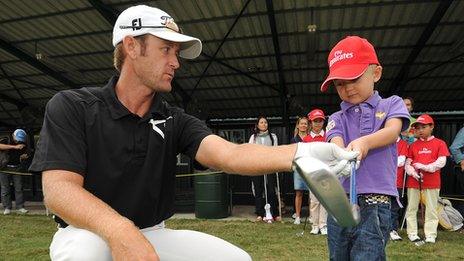Ryder Cup: More to Europe than Rory McIlroy – Iain Carter
- Published
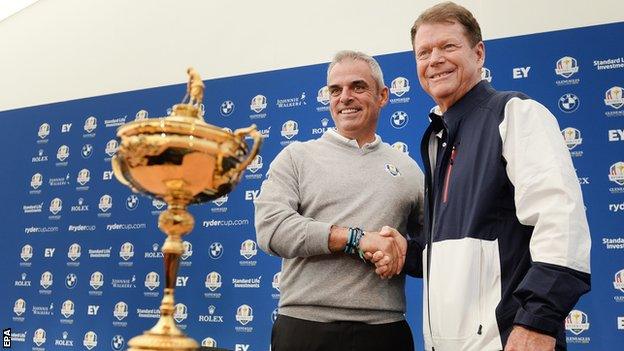
Ryder Cup captains Paul McGinley and Tom Watson edged closer to revealing their opening pairings with the make-up of Wednesday's practice groups
As we assess where this Ryder Cup will be won and lost, Rory McIlroy correctly and succinctly sought to play down his influence on the outcome at Gleneagles this week.
The United States team have repeatedly stated that beating the world number one would give them a boost of greater significance than the point they would put on the scoreboard.
The theory follows that McIlroy should therefore be targeted in the draw, along with the talismanic Ian Poulter, who boasts an 80% winning record in his four Ryder Cups to date.
"They win a match against me, they get a point. No more, no less," McIlroy said.
He was stating the obvious but there was an underlying message. Europe are not a one man team. There is strength in depth in Paul McGinley's side.
Graeme McDowell says his relationship with Rory McIlroy has changed.
McIlroy and Poulter have dominated the build-up but there are two more figures just as likely to prove the engine room of the European effort.
Sergio Garcia and Justin Rose have been somewhat under the radar but both have the form and experience to lead the way for the home team in Scotland.
Garcia is playing his seventh Ryder Cup and has contributed 18 points from a possible 28 since making his first appearance in 1999. In that debut at Brookline he demonstrated a Tigger-like enthusiasm for these biennial jousts that has never dimmed.
"The drive to do well and obviously win, it's still the same," he said. "Once you put your clothes on and your shoes on and you step on the first tee, you still want to beat them as hard as you can."
In foursomes he's won eight of eleven matches while his dependable driving makes the Spaniard a huge asset in the fourballs. The world number three is in fine form as well; in his last eight tournaments he boasts five top 10 finishes, including three runner-up positions.
Foursomes, four-balls and singles | |
|---|---|
Foursomes | Matches are played in pairs but each pair only gets one ball to play with. They take turns hitting the ball, with the first player hitting the tee shot, the second the second shot, the first the third and so on. One player hits the tee shots on odd-numbered holes and the other hits them on even-numbered holes |
Fourballs | Matches are played in pairs, but each player in the pair plays their own ball. At the end of each hole the player who needed the fewest shots counts for their team |
Singles | All 12 players from each team play one round against a member of the opposing team |
"We know how important the Ryder Cup is to all of us, how much it means to be part of this team; how difficult it is to be part of this team," Garcia added.
It's conceivable the Spaniard could team up with McIlroy in the Friday morning fourballs, especially if McGinley decides to break up the world number one's partnership with Poulter.
It was with McIlroy at his side at Medinah where Poulter unleashed his closing spell of Saturday evening birdies that began the remarkable European comeback from 10-4 down two years ago.
Poulter could also pair up with his old mate Rose, but that's more likely to happen in the alternate shot format rather than Friday morning fourballs. Rose paired with Henrik Stenson looks a good match-up for the better ball format and the Englishman will feel ready to play a lead role.
Oddly enough, this is only the third Ryder Cup for the 34-year-old and his first on home soil. Rose played in the defeat in 2008 and starred on the final day at Medinah two years ago.
That extraordinary session feels like a lone day of success in his Ryder Cup career. "Until that point we were being well and truly beaten," Rose told BBC Sport.
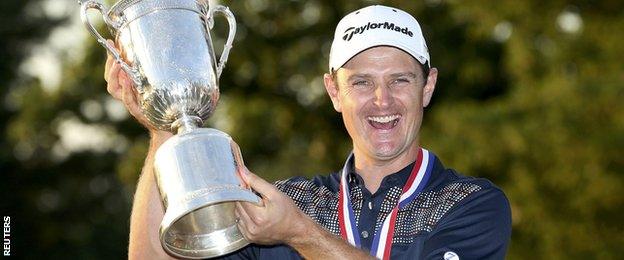
Justin Rose clinched his maiden major title to become the first Englishman for 43 years to win the US Open
"And in the previous Ryder Cup at Valhalla, external we were on the losing end of it there. So I've experienced six days of Ryder Cup golf and five of them have been pretty bleak."
But that tumultuous final day when the bleakness lifted proved the launch pad for Rose's career. His clutch putts on the final two holes to beat Phil Mickelson delivered a vital point for Europe but also provided a vital boost to the Englishman's self-assurance.
It undoubtedly helped him win the US Open in 2013. "I was surprised how comfortable I felt down the stretch at Merion," he admitted. "That's due to all the experiences I've had in the game and a big part of that was Ryder Cup.
"As a kid you wonder how these guys stand up to the pressure and I'm not really sure how we do it, but you trust your training and you get into it. To be able to pull off some of the great shots I did down the stretch you have to take confidence from that."
Rose is one of four major winners in the European team and the man who succeeded him as US Open champion, Martin Kaymer, is another.
The German, who holed the putt that retained the trophy two years ago, could partner McIlroy in foursomes and is expected to play a much more senior role this time. He made only two appearances in the victory two years ago.
Graeme McDowell is helping to shepherd Victor Dubuisson through his debut, while Lee Westwood is providing a similar role with the other rookies Stephen Gallacher and Jamie Donaldson.
Tom English in his BBC Sport column: | |
|---|---|
On Dubuisson: He has the game to be a sensation but, equally, he has the personality that could cut himself off from the group, an unreachable presence in European captain Paul McGinley's team room. | |
Despite their 2010 and 2012 victories, Europe are desperate to improve on a record in which they have won only two of the last nine sessions. McGinley's attention to detail should ensure they contend well in the foursomes and fourballs.
But as Rose points out the opposition is strong. "They've got a wonderful team," he said. "I don't really buy into the whole underdog thing. The last two Ryder Cups have come down to just one point each time. It's going to be tight, I'm pretty sure of that."
There are ready made partnerships in Tom Watson's side. Phil Mickelson (an unencumbered team leader in the absence of Tiger Woods) with Keegan Bradley, Bubba Watson and Webb Simpson and Matt Kuchar partnering rookie Jordan Spieth look likely combinations.
Ryder Cup 2014: Meet the Europe Ryder Cup team
The captain has re-introduced elements of Paul Azinger's successful pod-system from his victory in 2008 and vice captain Steve Stricker is a vital conduit between the team and their 65-year-old leader.
If the match is close after the sequences for fourballs and foursomes are completed on Saturday night then it will come down to the singles and this is where Europe appear to have the edge.
Sunday is the day when America is most likely to feel the absence of Woods as well as the injured Jason Dufner and the unavailable Dustin Johnson.
They would surely have also liked to have had Billy Horschel and Chris Kirk in their ranks as well, but their play-off exploits came too late to convince Watson for wildcard picks.
In the Sunday singles the experience and firepower of the likes of McIlroy, Poulter, Garcia, Rose and McDowell could well prove the difference for Europe.
Ryder Cup 2014 on the BBC |
|---|
Friday: BBC Radio 5 live 08:30-19:00. Highlights: 20:30-22:00 BBC Two, BBC Two Scotland and BBC Two NI; 23:05-00:35 BBC Two Wales |
Saturday: BBC Radio 5 live 08:30-18:30. Highlights: 20:30-22:30 BBC Two |
Sunday: BBC Radio 5 live 11:00-18:30. Highlights: 19:30-21:30 BBC Two |
Live text & radio commentary, and video highlights, of all three days available on the BBC Sport website. |
- Published24 September 2014
.jpg)
- Published23 September 2014
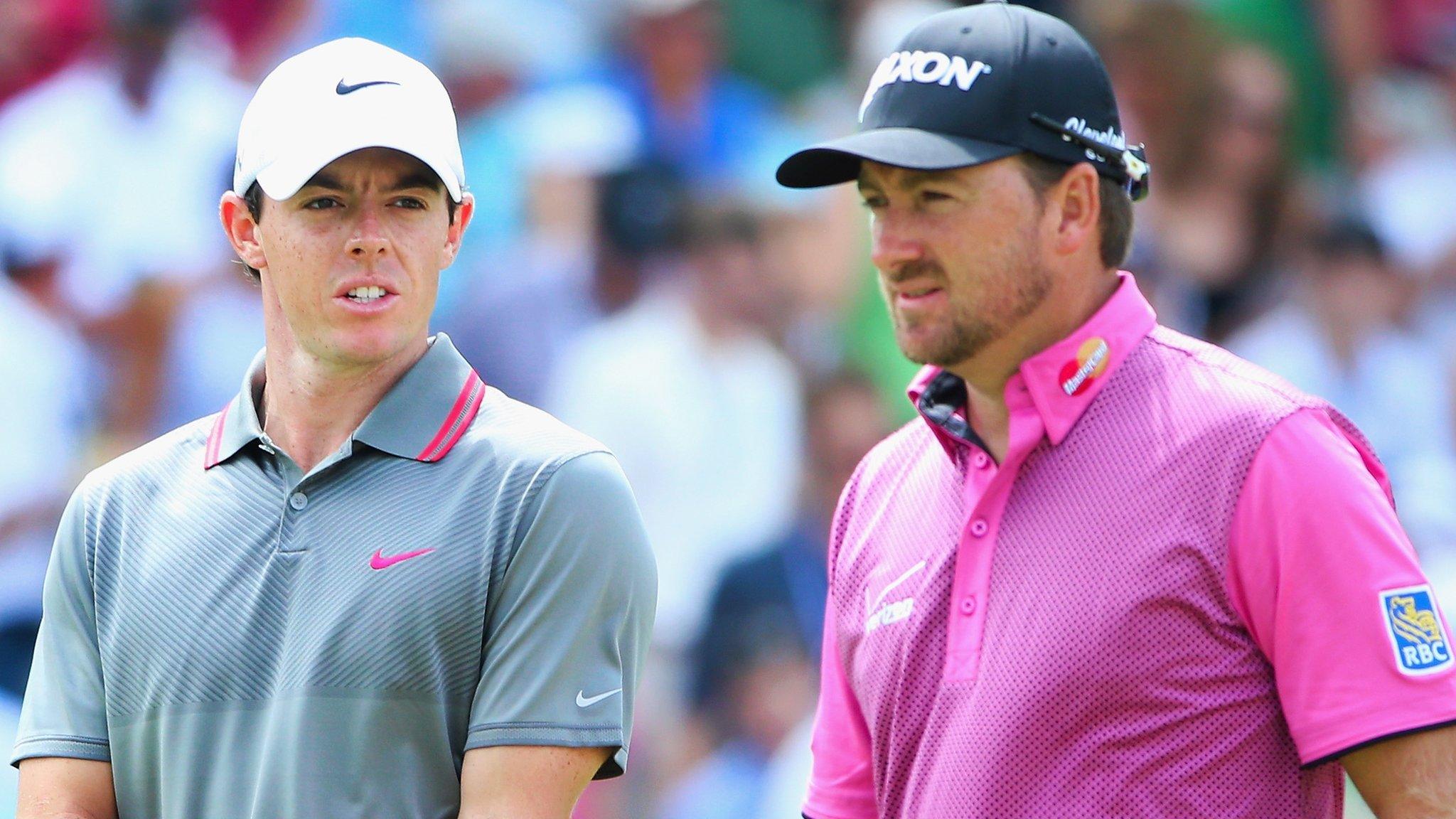
- Published23 September 2014
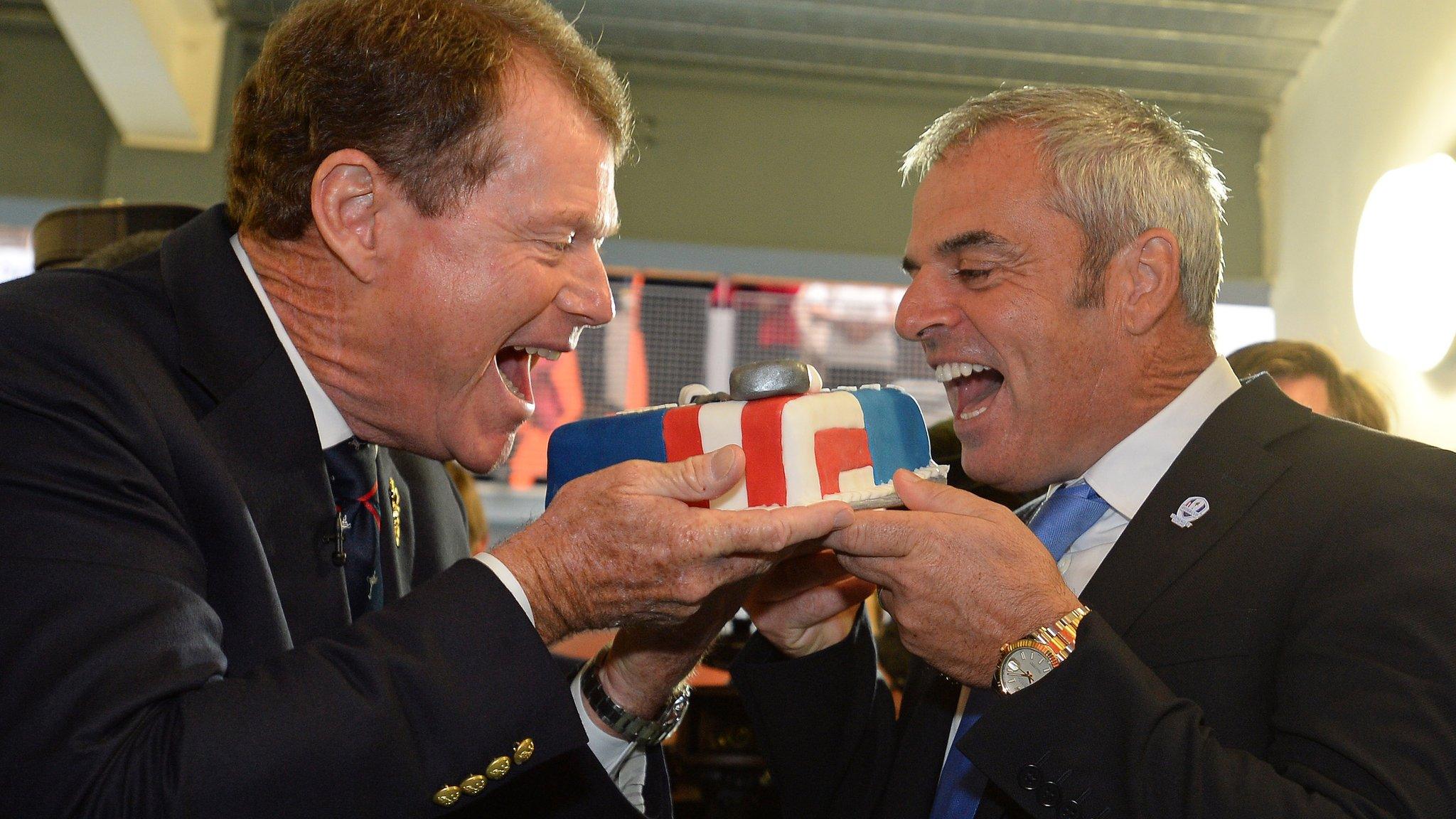
- Published23 September 2014
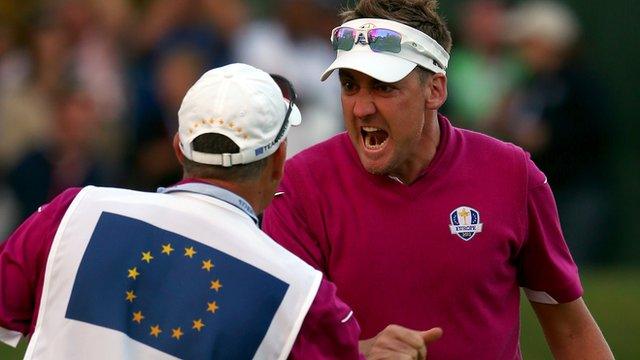
- Published23 September 2014
.jpg)
- Published22 September 2014
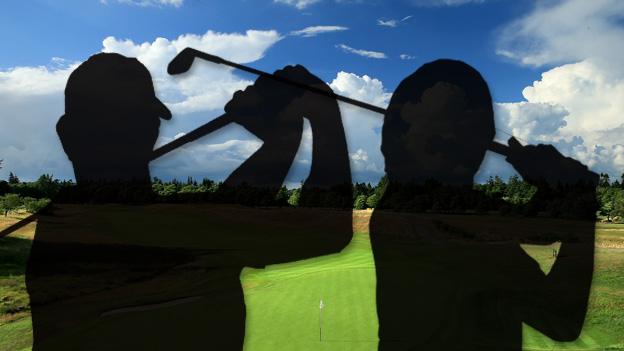
- Published24 September 2014
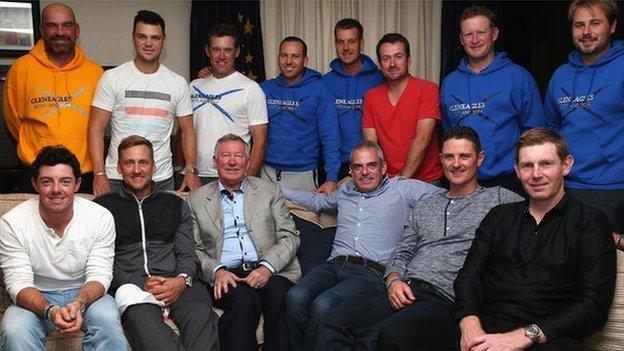
- Published22 September 2014
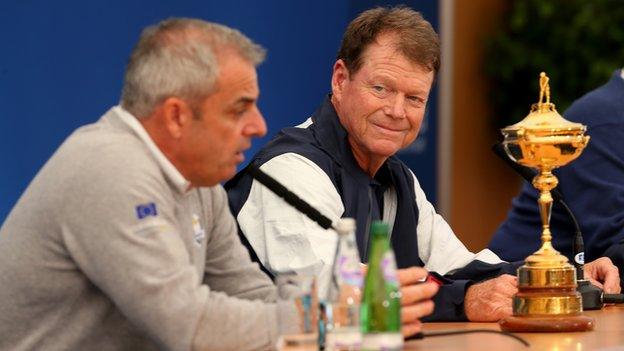
- Published21 September 2014
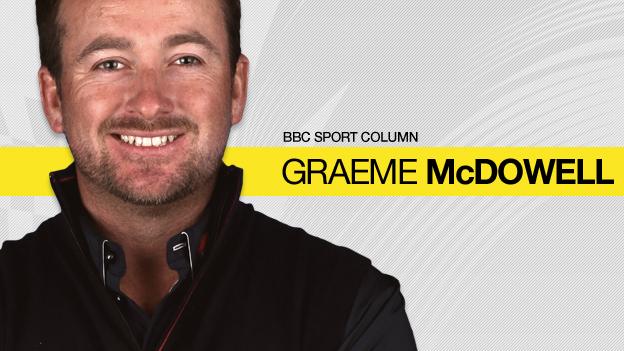
- Published21 September 2014
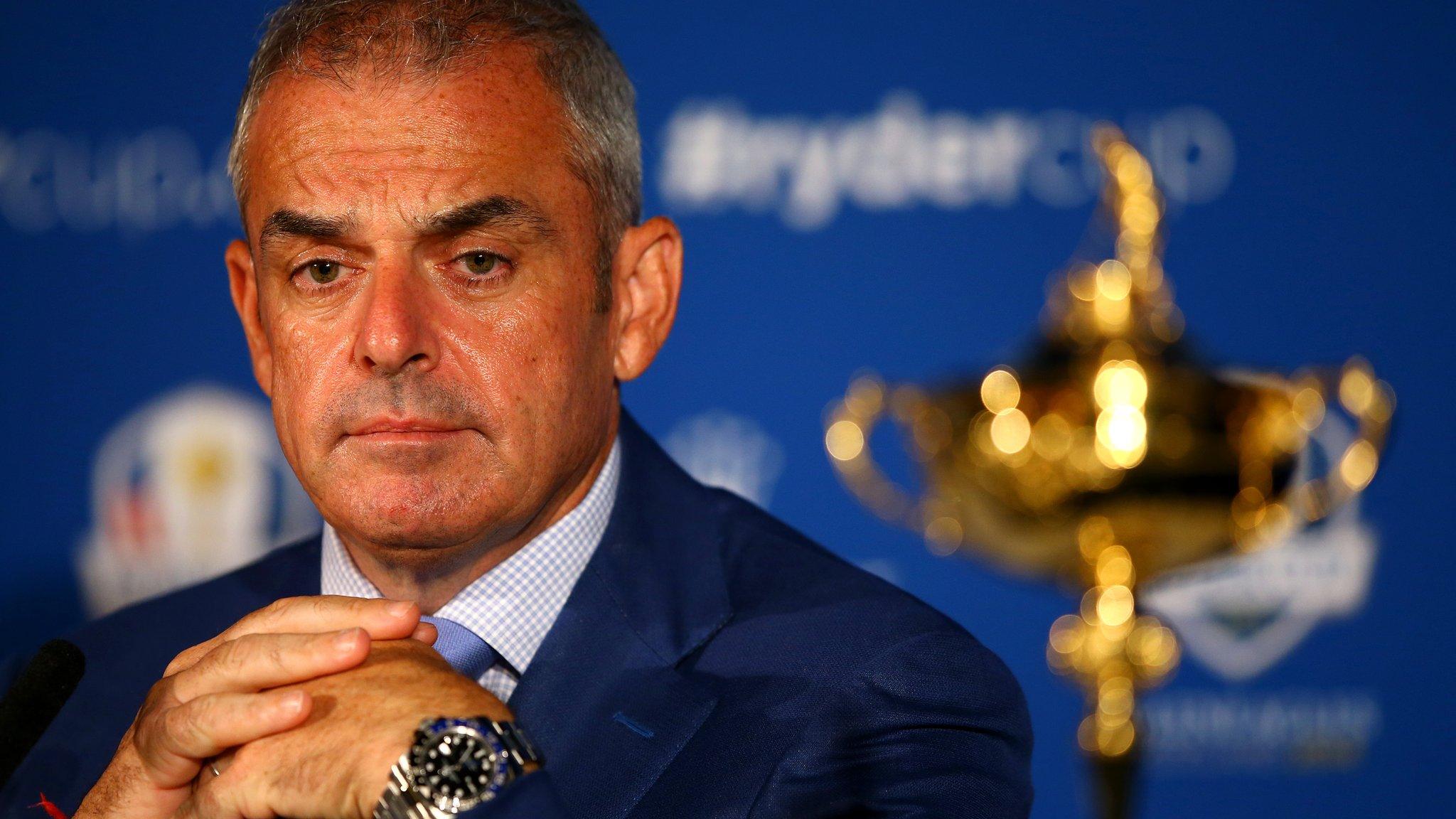
- Published20 September 2014
- Published28 September 2014
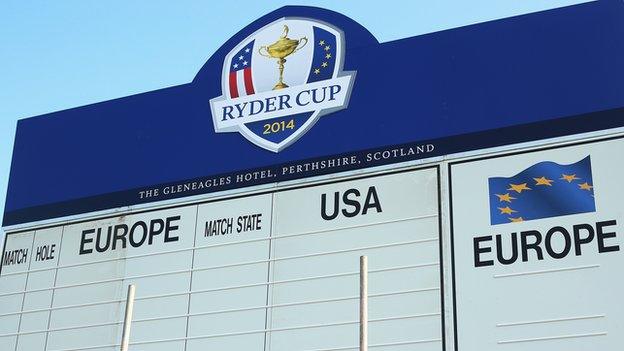
- Published2 October 2016
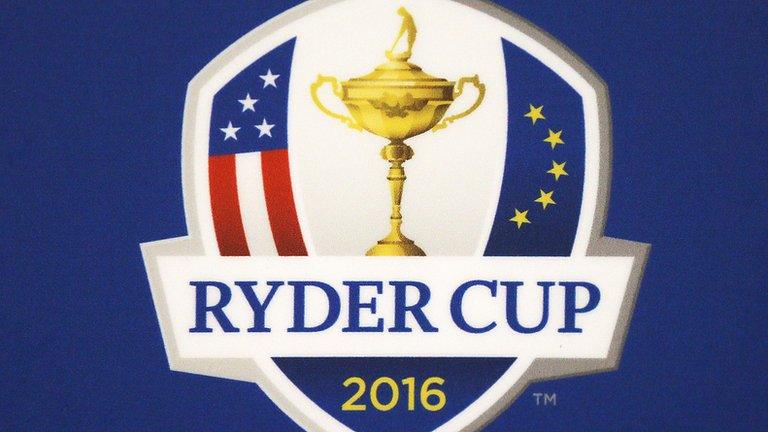
- Published28 September 2018
